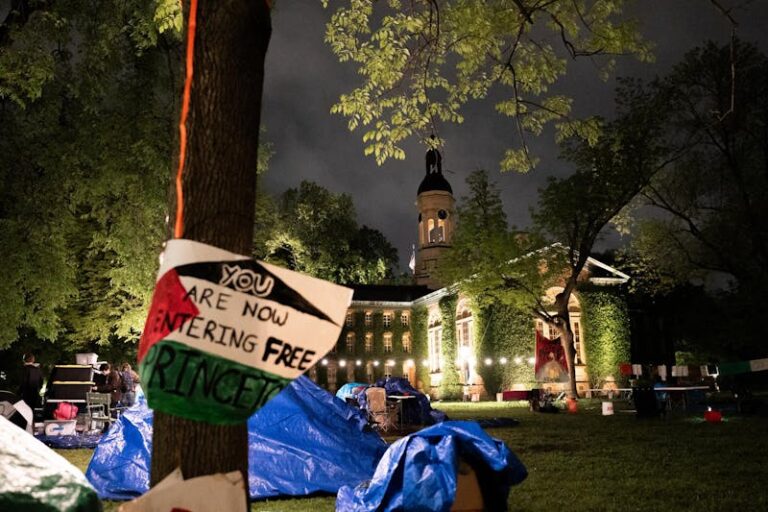The following is a guest contribution and reflects solely the views of the author. To submit an article to our opinion section, here.
In response to the Gaza solidarity camp that began on April 25, more than a dozen student organizations issued statements of solidarity with student protesters condemning the University’s arrest of two graduate students. I have read several letters, including those written by the Black Student Union (BSU), Generational African American Student Association (GAASA), Princeton Arab Society, and others. Most of the letters were similarly structured, explicitly acknowledging the genocide taking place in Gaza and standing in solidarity with Palestinians. I expected the Asian American Student Association (AASA) response to be similar.
However, I was disappointed with AASA’s weak statement, especially given the “delayed” release of a letter that should have been more thoughtfully written. This was just the beginning of a pattern of political apathy that I would begin to notice within the Asian American student organization. As Asian American students, we must continue to build on our tradition of political activism in America. As recent reactions to pro-Palestinian activism have shown, we cannot rest on our laurels when there are still many injustices in the world that need to be righted.
AASA’s recent statements regarding the recent student protests are full of examples of political ignorance. For example, their open letter states:[s] In describing the crisis as a “current human rights crisis,” the statement conclusively ignores the systematic oppression and murder of Palestinian civilians by the state of Israel, a situation that UN experts have labelled “genocide.” The AASA letter’s use of the phrase “innocent lives being taken” does not adequately convey the gravity of the genocide.
But above all, I believe AASA’s most serious failure is its political passivity, which is in contradiction to its history of political activism. In their statement:[p]”Peaceful protest and student/alumni advocacy are inextricably linked to AASA’s roots, and we have been and remain committed to these values,” it states, although it is unclear what “remain committed” means when no other action has been taken beyond the release of this letter. AASA’s historical nonviolent political activism only serves to contrast starkly with its current inaction.
Moreover, political isolation from the Gaza crisis mispositions the issue on the fringes of the Asian American political agenda, overlooking the fundamental truth that Asian American identity is born out of both cultural heritage and a sense of activist solidarity.
Asian American identity was formed in reaction to being labeled as “Oriental.” Palestinian American writer Edward Said (Class of 1957) was instrumental in galvanizing an intellectual movement to unite people categorized as “other” in American society through the concept of “Orientalism,” a concept that explicitly encompassed Palestinian identity and was later adopted to include other Asian identities. Given this historical context, the struggle for Palestinian liberation is fundamental to the values of solidarity and inclusion for which Asian Americans should fight.
An email from AASA announcing the continuation of the APIDA Heritage Dinner on May 4 defended the continuation as a measure to “show solidarity among Asian minorities” because “through this united front, we can support the rest of the world.” The reference to Palestinians being part of “the rest of the world” implies that they are excluded from the Asian community. Aside from Palestine’s geographic location in West Asia, this reference shows a false understanding of what it means to be Asian.
It is therefore contradictory for AASA to claim to support activism and solidarity, yet never engage beyond its letter. AASA has a dual responsibility to celebrate Asian American cultural identity and to politically engage the community. We need to broaden our understanding of solidarity to include not only Palestinians who have lost their lives in a genocidal movement, but all those who have been marginalized.
More significantly, most of my criticism so far has been directed primarily at AASA, as it is one of the few Asian American student organizations that has commented on the conflict. At a time when silence means complicity, the silence of several prominent Asian American campus organizations resonates louder than ever. Most notably, the Chinese Students Association (CSA), Japanese Students Association (JSA), Korean Students Association (KSA), South Asian Students Association (SASA), and Taiwanese American Students Association (TASA) have yet to issue a statement regarding the protests.
Princeton’s Asian American community has many politically active and vocal members. I am not alone in my criticism and disappointment in the student body that is supposed to represent me. These failures are evidence that we, as members of the Asian American community, have a shared responsibility to hold our leaders accountable. And if we don’t, we will be held accountable.
To act in keeping with our values of solidarity and inclusion, I urge members of the Asian American community to not only become more politically aware and engaged in light of the global situation, but also to demand better leadership from our elected allies who represent us. We need to take a stronger stance against the genocide to which our university’s silence is complicit. Asian Americans have a long history of political activism, and it is up to us to carry on this proud tradition. Let us take action that is practically aligned with AASA’s mission goal of “increasing democratic participation, civic engagement, and political consciousness” and rise up in the broader political struggle for liberation around the world.

Jacqueline Zhou is a second-year philosophy student and can be contacted at jacqueline.zhou.[at]Princeton

